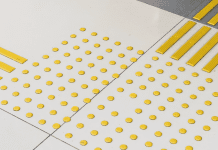The Association for Specialist Fire Protection has published three new advisory notes and updated another covering a range of topics related to fire stopping, penetration seals and smoke seals
The Association for Specialist Fire Protection (ASFP) was formed in 1975 to serve and represent the needs of its members and the wider passive fire protection industry by raising standards and competence through training, testing, certification, and quality of installation and maintenance.
In June, it published three new advisory notes and updated another covering a range of passive fire protection measures.
Advisory Note 13 covers testing of partial penetrations, for example, socket boxes, which are installed in drywall systems.
Firestopping products are made to help maintain the performance of a wall where such electrical boxes have been added. A CEN standard is currently being drafted to cover the testing of these products.
However, in the interim period, AN 13 suggests that the firestopping of these products is undertaken using an ad hoc approach based on testing to BS EN1364-1: Fire Resistance Tests for Non-Loadbearing Elements. Walls.
Advisory Note 30 covers the transition from CE marking to the UKCA mark
It explains how all the different passive fire protection product families are affected, describing the likely next steps in the process.
It aims to help manufacturers and specifiers alike to understand what will be required during the transition period.
Advisory Note 31 covers smoke seals used in conjunction with active fire curtains. AN31 was produced in response to false claims that manufacturers used draught excluders to prevent the passage of cold smoke and that these would be of limited use in a fire resistance test scenario.
The document explains that the performance smoke seals used are the same technology as might be used in smoke leakage-rated fire-resisting doors. Where smoke seals are added for a leakage test, they also have to be present for the corresponding fire test.
Advice on the interchange of flexible wall systems for service penetration seal systems has been updated
Advisory Note 15 has been updated. This explains the interchange of flexible wall systems for service penetration seal systems. When first published, this note provided pictorial clarification of a long-winded statement in BS EN1366-3: 2009: Fire Resistance Tests for Service Installations. Penetration Seals.
This standard has been amended and some of the scenarios permitted in the 2009 version are not now reproduced in the 2021 version. The drawings in AN15 have been amended to bring them in line with BS EN 1366-3: 2021.
ASFP Advisory Notes are available to download for free from the ASFP Publications library.
ASFP training: Level 2 and Level 3 in Passive Fire Protection
The ASFP Foundation Course in Passive Fire Protection Level 2 takes place in September.
ASFP Level 2 training course structure
The classroom-based course is delivered by experienced passive fire protection experts and consists of five lectures spread over five weeks (one full day of lectures per week).
The course offers a foundation in fire safety and fire science, as well as units on different forms of PFP, and is structured into four modules:
- Module 1: Essential underpinning knowledge, fire science.
- Module 2: Installation of Passive Fire Protection:
-1.0: Fire protection to the structural frame of the building, fire retardant coatings.
-2.0: Fire-resisting walls, floors and ceiling and fire-resistant glazing.
-3.0: Firestopping, penetration seals, cavity barriers, ductwork and dampers and the building envelope.
-4.0: Fire-resisting doors, industrial shutters and hardware. - Module 3: Understanding active fire protection.
- Module 4: Understanding Building Regulations, approved documentation, regulatory guidance, CDM, CE marking and codes of practice, and BIM.
Assessment is carried out in a 1.5-hour written exam.
The course takes place in Coventry and Dublin in September and October on the following dates:
Coventry
- 1 September.
- 8 September.
- 15 September.
- 22 September.
- 29 September.
To book, visit: https://asfp.org.uk/events/EventDetails.aspx ?id=1681377&group=
Dublin
- 7 September.
- 14 September.
- 21 September.
- 5 October.
To book, visit: https://asfp.org.uk/events/EventDetails.aspx ?id=1721886&group=
The ASFP Foundation Course in Passive Fire Protection Level 3 is a high-level course designed to equip delegates with the knowledge to study towards the IFE Level 3 in passive fire protection.
Those with IFE Level 3 certification are eligible to apply to join the IFE at technician level, enabling them to gain professional recognition in the global fire sector and use the post-nominal TIFireE.
ASFP Level 3 training course structure
The classroom course consists of seven lectures, spread over seven weeks (one full day of lectures per week) and is structured in four modules:
- Module 1: Essential underpinning knowledge, fire science.
- Module 2: Installation of Passive Fire Protection:
– 1.0: Fire protection to the structural frame of the building, Fire retardant coatings
-2.0: Fire-resisting walls, floors and ceiling and fire-resistant glazing.
-3.0: Firestopping, penetration seals, cavity barriers, ductwork and dampers and the building envelope.
-4.0: Fire-resisting doors, industrial shutters and hardware.
- Module 3: Understanding active fire protection.
- Module 4: Understanding Building Regulations, approved documentation, regulatory guidance, CDM, CE marking and codes of practice and BIM.
Assessment is carried out in a three-hour written examination offered by the IFE.
The course is suitable for managers and technical supervisors working in passive fire protection, technical sales staff, designers, inspectors and enforcement officers and fire risk assessors.
The course takes place in Manchester, Reading and Dublin from August to October:
Manchester
- 15 August.
- 22 August.
- 29 August.
- 5 September.
- 12 September.
- 19 September.
- 26 September.
To book, visit: https://asfp.org.uk/events/EventDetails.aspx ?id=1681374&group=
Reading
- 17 August.
- 24 August.
- 31 August.
- 7 September.
- 14 September.
- 21 September.
- 28 September.
To book, visit: https://asfp.org.uk/events/EventDetails.aspx ?id=1681375&group=
Dublin
- 7 September.
- 14 September.
- 21 September.
- 26 September.
- 28 September.
- 3 October.
- 5 October.
To book, visit: https://asfp.org.uk/events/register.aspx ?id=1721986&itemid=0e67284e-6e20-453e-8818-14bba2dc03a7
Association for Specialist Fire Protection
Tel: +44 (0)247 693 5412

















